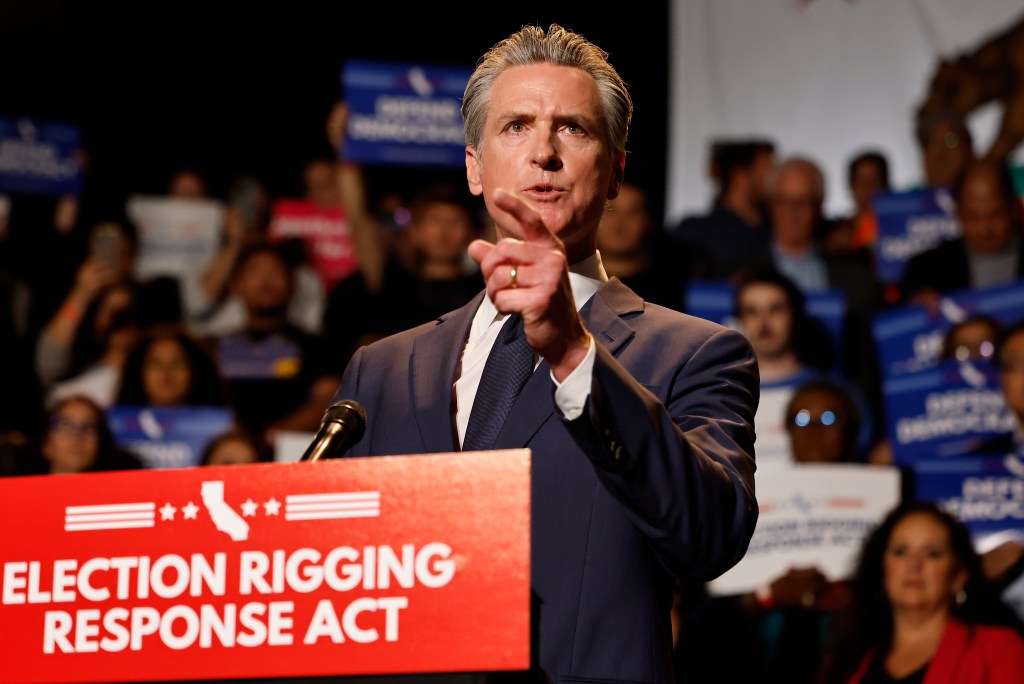
Gov. Gavin Newsom’s gambit to squeeze more Democratic congressional seats out of California mid-decade is developing as a high-stakes fight with President Donald Trump for control of the House of Representatives.
Newsom is asking voters to approve, in a special election this November, a partisan gerrymander of California’s congressional districts and temporarily bypass the independent state redistricting commission charged with mapping House seats. The governor, responding to a similar Republican maneuver in Texas initiated at Trump’s insistence and aimed at preserving the GOP’s thin House majority, is framing the campaign as a choice: Help Democrats check the president in next year’s midterm elections—or empower him.
“The rule of law, not the rule of Don—that’s what this is about,” Newsom, a presumed contender for his party’s 2028 presidential nomination, told reporters Wednesday during a conference call organized by the Democratic National Committee. “This is not about redistricting lines, it’s about holding the line.” (Newsom proposes sidelining the California Citizens Redistricting Committee until the next regularly scheduled reapportionment in 2030.)
Matt Rexroad, a veteran Republican operative in California and redistricting expert, argues Newsom is eager to become Trump’s chief Democratic foil as he mulls a White House bid. But Rexroad also worries Newsom’s strategy will succeed. California is a deep blue state, and Trump is particularly unpopular: The president garnered 38 percent of the vote last year, his best performance after receiving 33 percent and 35 percent, respectively, in 2016 and 2020.
“Redistricting is like the 10th most important thing on this ballot measure—even though it is about redistricting,” Rexroad told The Dispatch, explaining that the real question voters will consider about Proposition 50 is: “Do you agree with what Donald Trump’s trying to do with America, or do you agree with Gavin Newsom pushing back?”
In Texas, the Legislature and the governor retain authority over the political makeup of congressional seats. At Trump’s behest, Gov. Greg Abbott and the Republicans who control Texas’ House of Representatives and Senate are taking the rare step of redrawing congressional district lines before the next constitutionally mandated decennial census in 2030. Sources tell The Dispatch that neither the National Congressional Campaign Committee nor Texas’ GOP congressional delegation were consulted by the White House in advance.
Texas Republicans are optimistic the new map, poised for approval this month, could net the party up to five House seats in 2026, improving on its 25-13 delegation advantage. However, some GOP operatives in the state worry the result would be more competitive districts—and Democratic gains—if the midterm election is a backlash against Trump, as in his first term. Democrats are hopeful the new California map, being fast-tracked for a November 4 special election, offsets any Republican pickups in Texas. Democrats hold a 49-9 edge in California, and like in Texas, mid-decade redistricting risks unexpected outcomes.
Newsom’s so-called Election Rigging Response Act appears to have real potential. According to a poll fielded by the governor’s political operation August 10-14 and shared with The Dispatch Wednesday, a hypothetical voter initiative “described as one that will adopt temporary Congressional district maps under the condition that Texas or other states redistrict mid-decade” was supported by 57 percent of likely voters; 35 percent opposed.
Those numbers differ significantly from an initial poll of registered voters conducted for Politico that found support at 36 percent, with 64 percent opposed. However, this survey was worded much differently, omitting the word “temporary” from the context of the question: “Governor Newsom has suggested returning congressional line drawing authority back to the Legislature, citing concerns that redistricting efforts in Republican states would give them a partisan advantage.”
In 2010, voters in California approved a ballot measure shifting the power to draw legislative and congressional district lines from the Legislature and the governor to the Citizens Redistricting Commission. The panel is composed of five Democrats, five Republicans, and five commissioners unaffiliated with either of the two major political parties. The passage of Proposition 20 nearly 15 years ago was the culmination of a yearslong effort by then-Gov. Arnold Schwarzenegger to reduce partisan gerrymandering.
Schwarzenegger is one of many Republicans mobilizing to defeat Proposition 50.
Kevin McCarthy, former California congressman and former speaker of the House of Representatives, is raising money to support Right Path California, a political group run by Jessica Patterson, the former chairwoman of the California Republican Party. Patterson’s group will focus primarily on partisan messaging more likely to appeal to Republicans and other center-right voters. A second group, the Protect Voters First Act Coalition backed by wealthy GOP donor Charles Munger Jr., will deliver apolitical messaging that promotes the good-governance benefits of maintaining the state’s redistricting commission.
In interviews, both Patterson and Amy Thoma Tan, a spokeswoman for the Protect Voters First Act Coalition, were adamant that voters’ opposition to political gerrymandering would overcome concerns they might have about Trump’s push to maintain Republican control of Congress by pushing Texas and other red states to enact new, GOP-friendly maps ahead of the midterm elections.
“California Democrats and Gavin Newsom are trying to take the power away from the people and the Citizens Redistricting Commission and return it back to politicians—and nobody likes that idea,” Patterson said.
“These [new Democratic] lines go through the end of the next census; so if it’s just about Trump, why aren’t they sunsetting in two years?” Thoma Tan added. “We have so many competitive congressional elections, which can be a good thing because they have to be responsive to their districts and this will take that competitiveness down. We think voters won’t like that.”
















